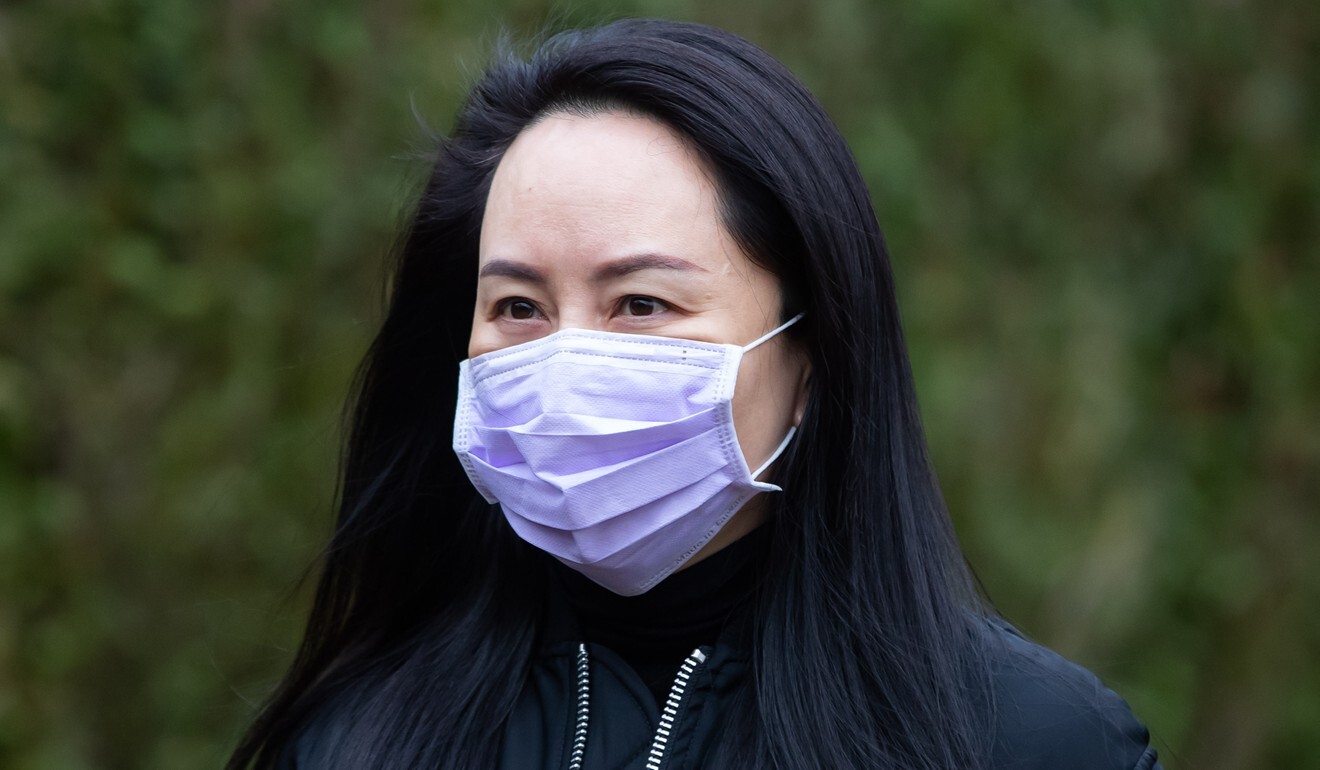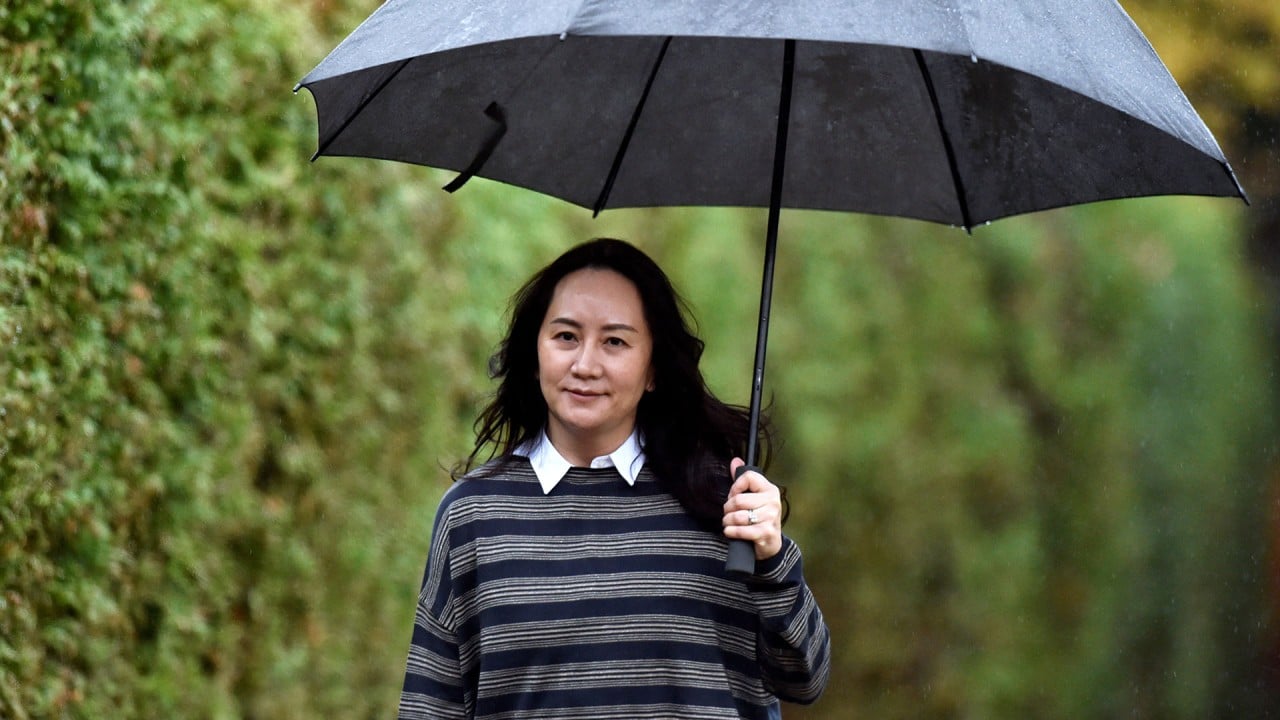Meng Wanzhou’s political abuse claims ‘moot’ because Trump lost US presidency, Canadian court told
- Huawei CFO’s argument that she was pawn in US trade war with China is weak and hyperbolic, according to extradition case filing
- Remarks by Trump that he might intervene in the case were contradicted by other officials, said lawyers acting for the US

Claims by Huawei Technologies executive Meng Wanzhou that she is the victim of a politicised abuse of process, and that an American bid for her extradition should therefore be thrown out, are “moot” because Donald Trump is no longer US president, Canadian government lawyers have said in a court document.
The lawyers, acting on behalf of US interests in the long-running extradition battle, also said the abuse argument, depicting Meng as a pawn in Trump’s trade war with China, was weak and “hyperbolic” and should be dismissed.
US prosecutors want Meng to face trial in New York on fraud charges, and are seeking to have her extradited from Vancouver, where she was arrested more than two years ago, throwing China’s relations with Ottawa and Washington into turmoil.
“This application is moot. The facts on which it is based – statements by a president no longer in office, about a possible intervention in this case that never occurred, purportedly to achieve a trade deal that has long since been successfully negotiated – have no past, present or prospective impact on these proceedings,” the government lawyers said.
The response to the application was lodged with the Supreme Court of British Columbia on January 25, but only made public on Thursday. Even if not moot, the statements by Trump on which the argument relied did not amount to misconduct alone, and were inconsistent with those of other officials, the lawyers said.
“The applicant has filed a highly selective factual record, and seeks to compensate for its weakness through hyperbolic characterisation of the supposed impacts of the statements,” they added.
Meng, the daughter of Huawei founder Ren Zhengfei, is accused of defrauding HSBC by lying to the bank about Huawei’s business dealings in Iran, and thus putting HSBC at risk of breaching US sanctions on the Middle East country.
On December 11, 2018, 10 days after Meng’s arrest at Vancouver’s airport, Trump was asked by the Reuters news agency if he would intervene in her case.
“Whatever is good for the country, I would do,” he was quoted as saying. “If I think it’s good for what will be the largest trade deal ever made – which is a very important thing – what’s good for national security – I would certainly intervene if I thought it was necessary.”
Meng’s lawyers have argued that this and other remarks by US officials showed the case against Huawei’s chief financial officer was politically tainted.
Her lawyers also cited a December 12, 2018 interview on Fox News by Trump’s then-secretary of state Mike Pompeo, in which he was asked about Trump’s remarks to Reuters. Pompeo said: “Any time there is a law enforcement engagement we need to make sure we take foreign policy considerations into effect. It’s totally appropriate to do so.”
But in their response to the abuse claims, the Canadian government lawyers say such remarks were followed by “a formal statement to Reuters, emphasising that the charges against the applicant were brought based on evidence and in accordance with the rule of law”.
The simple fact that Trump, who left office last month, no longer had any power to intervene in the case invalidated the abuse argument, they said.
“[Trump] has no authority to intervene in the case due to his departure from office. Second, during the time he was in office, there is no evidence that he did intervene; indeed the best evidence that exists [is] that he did not,” they said.
“Finally, the limited context in which the former president mused about intervening – trade negotiations – no longer exists as those negotiations have long since ended. The very thin basis on which this application was launched has vanished.”

As for Canada’s role in any political abuse, the response cited remarks on December 14, 2018 by then Canadian foreign minister Chrystia Freeland who said “the detention of Ms Meng was not a political decision on Canada’s part”.
In a separate application, Meng’s lawyers have argued that the extradition case should be stayed because the US submitted an allegedly misleading record of the case (ROC) to the court.
That ROC had referred to a PowerPoint presentation delivered by Meng to an HSBC executive, but it omitted slides from the presentation that her lawyers say show HSBC was properly informed of Huawei’s business dealings in Iran.

04:43
How the arrest of Huawei CFO Meng Wanzhou soured China's relations with the US and Canada
In a response that was also lodged on January 25 and released on Thursday, the Canadian government lawyers said there was nothing misleading about the omission. “A summary, by its nature, is a selection … The mere absence of certain evidence from the summary does not establish misconduct.
Meng’s lawyers are due back in court on Friday for a case management conference.
Further hearings in the extradition case are expected to continue until May 14, but appeals could drag proceedings out for years.
Meng is currently living under partial house arrest at a C$13 million (US$10.2 million) mansion she owns in Vancouver.